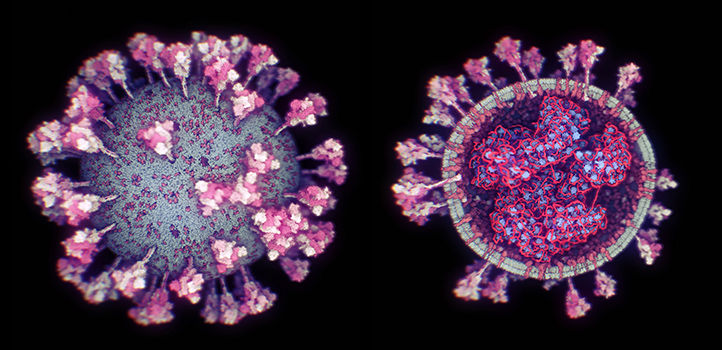The novel coronavirus is also commonly known as SARS-CoV-2 virus which is still a puzzle that the researchers around the world are trying to solve. So far, it is understood that SARS-CoV-2 belongs to the same family of viruses that had caused outbreaks of Severe Acute Respiratory Syndrome (SARS) from 2002-2004 and Middle East Respiratory Syndrome (MERS) in 2012.
Researchers have also found that, unlike other coronaviruses, SARS-CoV-2 particles are spherical in shape and have proteins called spikes protruding from their surface. Meanwhile, everyone is now familiar with the spike protein image of the virus. But do you know what the inside of the virus looks like?
The Scientists at King Abdullah University of Science and Technology (KAUST) in Saudi Arabia have released the most up-to-date illustration of the coronavirus, presentation of both its external appearance and internal structure. This visualization was created by a 3D model that they had developed using the information from electron microscope images and protein databases.
KAUST research scientist Ondřej Strnad said, “Our 3D model demonstrates the current state-of-the-art structure of SARS-CoV-2 at the atomistic level and reveals details of the virus that were previously impossible to see, like how we think nucleocapsid proteins form a rope-like structure inside it”
He says, new information could be included into the model to provide an up-to-date structure of the virus. Hence, they are hoping that this new model can soon help with treatments for Covid-19.
How It Is Different From Other Available Models?
KAUST computer science Ph.D. student Ngan Nguyen claims that their model shows the complete viral ultrastructure known to date, and “not just some arbitrarily placed, incomplete spike proteins on a lipid membrane.”
“Scripps Research Institute, U.S., provided us with the most likely hypothesis for the structure’s interior based on current data. If this hypothesis is proven wrong, then we can easily update the model,” Nguyen explains.
The detailed SARS-CoV-2 model can help in revealing aspects of the virus and its structure that could speed up drug discovery for treating COVID-19. The researchers can next start their planning to design a user-friendly graphical user interface to make it easy to use.











